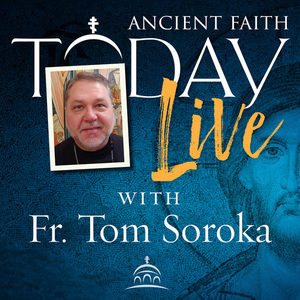FOCUS North America’s Interim Executive Director, Kenneth Kidd, and Fr. Paul Abernathy, Executive Director of the newly created Neighborhood Resilience Project, discuss the Orthodox impact in Urban Neighborhoods with Fr. Tom Soroka in a recent episode of Ancient Faith Today Live.
Here are some takeaways from the discussion:
Orthodoxy in America began in cities.
The wave of Orthodox Christians that came to America in the early 1900’s were mostly poor, working class laborers and small business owners looking to build a new life. These Christian migrants built churches, neighborhoods, and lived out their faith in America’s industrial cities. Time passed and family businesses became successful, laborers acquired wealth, and the urban landscape changed.
As economic landscapes shifted mid-century, so did the demographic landscapes of cities. New neighbors moved to the neighborhoods that were first built by the Orthodox Faithful. Communities who built their churches as the center of their urban lives began to live in the suburbs and commute to the city for services.
Fr. Tom shares that “a church which is made up of members from outside the area surrounding the church can become insular and isolated. It can focus on itself while ignoring or even fearing those on the ‘outside’ who may not look like them or share their values or culture.”
Today all of our American churches, especially those who find themselves in communities like Fr. Tom described, must challenge themselves reach out to the neighborhoods surrounding the parish. Both to help those in need, and to proclaim the usefulness of the gospel in word and deed to every human person – especially the “least of these.”
To serve we need to listen.
Orthodox Christians have a unique opportunity to live the Gospel through urban outreach. Fr. Paul Abernathy shares “some neighborhoods suffering is more open and honest than other neighborhoods.” The work of FOCUS in Pittsburgh, which has recently grown into the creation of a new nonprofit, the Neighborhood Resilience Project, works with trauma affected communities where suffering is at the surface of daily life. In other neighborhoods, suffering may be less visible, but that doesn’t mean it’s not there.
How do we know what can we do to serve people who are suffering and in need?
Fr. Paul says we have to build the ministry around the people we are serving, and the best way to do this is through listening. In the early days of FOCUS in the Hill District of Pittsburgh, FOCUS staff and volunteers did a lot of listening. They invited people in, and also went out into the community to connect. If we go into a community with an idea of how to serve without listening, our understanding of the needs usually end up being wrong. “The people themselves know very well what the community needs,” said Fr. Paul. We must first create opportunities to listen and connect.
“Understanding” sets FOCUS apart from other outreach ministries.
At FOCUS, we approach service in a way that recognizes the fullness of both those in need and those who serve. Each person is a living Icon of Christ. When we come together to meet a need, we share love, joy, and communion. We each play a unique role in creating the Kingdom on earth.
An example of this is the way we break bread with our neighbors at FOCUS. Many soup kitchens or food ministries operate as an assembly line, with clear boundaries between volunteers and those who come for a meal. Interaction and connection is kept to a minimum. Volunteers do their assigned duty and retreat to the kitchen, away from those who came.
In contrast to this approach, Kenny describes the way FOCUS serves meals as “family style.” Volunteers intentionally serve meals with dignity, and often join the people who come, share conversation, food, and community. When we take the time to sit at the same table, our common humanity is revealed, allowing us to serve like Christ. When we share and listen to stories, we realize we are all part of the same community – the community of God’s Kingdom.
Want to start a ministry? Start small, and expect challenges.
Kenny and Fr. Paul share two common challenges that arise when we seek to serve our communities. The first is our tendency as humans to stay in our comfort zones. Kenny shares that we must step outside of our comfort zones and go to the unknown – both at a personal level and at a church level – to accomplish meaningful service.
Fr. Paul shares another challenge – the desire for instant success. Our culture prioritizes instant gratification, and we must not fall into this temptation when we serve. The way of the cross is the way of perseverance, and we must be prepared to walk the way of the cross, fueled not merely by human love, but divine love.
Following Christ’s example to serve is not easy, but it is not new for us as Orthodox Christians. This work takes us back to our roots. Challenges will certainly arise. However, it is always worth the struggle. Through God, all things are possible. If you want to get started, Kenny says start small but don’t hesitate to act. If you have a small ministry and are interested in working with FOCUS – reach out!
Listen To The Full Episode:

February 4, 2020 Length: 1:02:35
Fr. Thomas interviews Fr. Paul Abernathy and Kenneth Kidd.
Fr. Thomas Soroka, the priest at St. Nicholas Orthodox Church in McKees Rocks, Pennsylvania, whose podcasts The Path and Sermons at St. Nicholas can be heard on Ancient Faith Radio, continues the great legacy established by former AFT host Kevin Allen of addressing contemporary culture from an Orthodox perspective. Listen as he interviews guests on the pressing current issues that affect Christians of all creeds and traditions.
FOCUS North America exists to support the growth of Orthodox Christian service efforts by providing engagement opportunities that reveal Christ in our neighbor and serve community needs within our five ministry areas of Food, Occupation, Clothing, Understanding, and Shelter.
Join our mission of engaging in Christ’s call to serve today!




